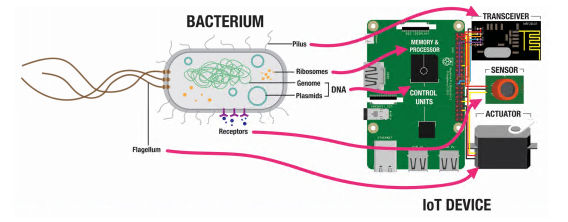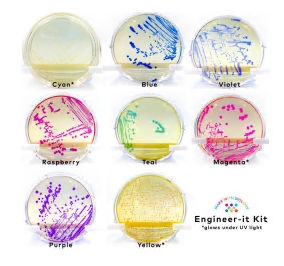| Too Good To Miss: E.coli Could Be Your Next Raspberry Pi |
| Written by Lucy Black | |||
| Sunday, 02 August 2020 | |||
|
Some of our articles deserve a second outing. Here we have one such from last October to add to our occasional Too Good to Miss series. It's all about E.coli and programming. No, it's not a story about food poisoning or anything at all to do with it. Research suggests that, with the right encouragement and understanding, the IoT crowd could change their hardware from silicon to bacteria. With a little more knowledge and a change in the way they view biology, hardware hackers could revolutionize the way many tasks are done. The paper by Raphael Kim and Stefan Poslad from Queen Mary University (London, UK) argue that the common bacterium E.coli is just like a Raspberry Pi:
Of course to program such "devices" we are going to have to learn how to work with DNA and indeed living cells. You workbench is going to look more like a biology lab than an electronics station. How are we to make this transition: "DIY Biology movement promotes increasing accessibility and affordability of tools, data, and materials of biotechnology. It capitalizes on the changing economic landscape of modern biotechnology industry, represented by the continually declining cost of DNA synthesis and sequencing. Currently, tools and techniques to run small-scale experiments with micro-organisms are widely available to the general public, through various channels, including maker spaces. Furthermore, there are supportive kits too." But microbes are dangerous aren't they? "Bacteria, especially E.coli, make an ideal tool for biohacking projects, given that they are easy to acquire, culture, and maintain. The industry standard strain K-12 E.coli, for example, which are used in Amino lab, are relatively safe to handle. They have been engineered to be non-pathogenic and difficult to spread outside of the laboratory environment. Unlike most species of bacteria, the K-12 strain can be purchased relatively easily in the U.S and most parts of Europe." I checked and yes you can buy the K-12 for a few dollars from educational suppliers. The part that mystifies me a little is the suggestion that we can "gamify bacteria". Given that the motivation of the DIY community in general is simply to do it I'm not sure gamification is needed. What really is needed are some good examples and some affordable starter kits. At the moment the starter kits that are available seem to have instructive rather than useful outcomes. For example, the Engineer it Kit by Amino Labs creates E.coli that create different colored proteins:
Is this the "hello world" of the bio IoT? If it is, where do we go next? Most DIYers want to create things that are useful or impressive and my impression is that creating such things using biological technology stands a good chance of changing something harmless into something that might be a threat - plastic eating E.coli anyone? What could possibly go wrong. As the paper concludes: "Although highly-engineered bacteria may provide efficient communication systems, ultimately, they are biological entities, which can produce unexpected outcomes (e.g. mutations). All in all, whilst the use of bacteria in IoT and HCI offer exciting opportunities, they also present fresh ethical challenges, which provide extra paths for discourse."
More InformationThe Thing With E.coli: Highlighting Opportunities and Challenges of Integrating Bacteria in IoT and HCI Raphael Kim and Stefan Poslad Related ArticlesE. coli Your Next Major Platform Programmed In Cello Traveling Salesman Applied To DNA Synthesis Book Stored On DNA - All Knowledge In Just 4gm of DNA A New DNA Sequence Search - Compressive Genomics Turing's Biological Pattern Theory Proved To be informed about new articles on I Programmer, sign up for our weekly newsletter, subscribe to the RSS feed and follow us on Twitter, Facebook or Linkedin.
Comments
or email your comment to: comments@i-programmer.info |
|||
| Last Updated ( Sunday, 02 August 2020 ) |




